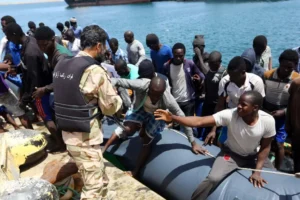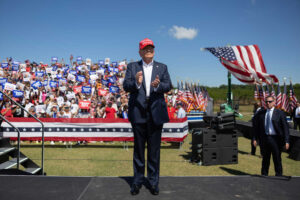As the year comes to a close, most summits are done with. The rarely held US- Africa Leaders’ Summit was held in Washington,13-15 December. It seemed like a well-prepared summit to signal the reengagement of the US with Africa whose importance is growing in the post-pandemic period. The last summit was held by President Barack Obama in 2015.
The Trump administration had largely ignored Africa and in the final year of his term Biden had tried to revitalise the partnership with Africa. Out of 54 members of the AU, 49 were invited. The excluded were those who were either suspended by the AU or did not meet US standards. Almost everybody among African leaders and spouses came.
With a fulsome three-day programme, the main signal of the summit was that the US is ready to re-engage with Africa in a more determined manner. It is crafting its relationship as a US-Africa relationship and not merely challenging China or Russia. African leaders made it clear that they were not prepared to join big power rivalry and the US seems to have responded to this well.
The US is not among Africa’s leading trade partners. In the transition from aid to trade and investment, the US has an important role to play. The opportunity that is Africa is now back into consideration as part of the post-pandemic recovery. Africa before the pandemic was attracting more investment and trade than aid. In this the US plays a bigger role, than Africa’s other partners.
Africa has used this year well, having held the EU summit in February and the Forum on China–Africa Cooperation (FOCAC) ministerial with China in December 2021.
There are several aspects which the US showed as reinvigorating the partnership with Africa. For one it seems like a whole of government approach with the Vice President, various secretaries and Congress being brought into the matrix.
Secondly, the lack of implementation of earlier commitments is sorely felt. In response to this, Biden announced the appointment of Ambassador Johnny Carson as the new focal point who will oversee implementation of the promises and play a coordinating role. This was welcomed by African delegations.
Among the significant decisions was the support to democracy and People to People relations. Biden had separate bilateral meetings with six African leaders whose countries will go for elections in 2023. They were encouraged to support free and fair elections.
Overall, the effort is to work collaboratively with African governments, business and people, provide them a greater role in global institutions and help to build stronger and sustainable economies with new technology, innovation, public health systems and to deal with food security and climate issues. Defending peace, democracy and security also remains high on the agenda.
Toward this, the initiatives that were announced include the following: the US plans to invest $55 billion in Africa over the next three years. This will require congressional approval and the Special Presidential representative for the US Africa Leaders’ Summit implementation Ambassador Johnny Carson will be part of this process.
A new diaspora council will enhance dialogue between US officials and African Diaspora in the US and contribute to fulfilling the US strategy towards Sub-Saharan Africa. Related to this, Vice President Harris announced that they would work with Congress to provide $100 billion towards the Young African Leaders Initiative, (YALI) over several years. This will support excellence among African youth and help them to become part of a transformational change in their communities.
At the global level, the effort for Africa to have a greater voice in the international order was emphasised. At the UNGA earlier this year, Biden had announced support for an expansion of the UN Security Council to provide permanent membership to Africa. Now he announced support for the AU to join the G 20 as a full member. Both these, if implemented, could provide Africa a better voice globally.
With regard to trade, investment and economic growth, loans up to $21 billion through the IMF for the Least Developed Countries (LDCs) will help support African resilience. The US will continue to support the G 20 Debt Relief initiative and seeks bilateral and private creditors to meaningfully provide debt relief which could help Africa in its economic recovery. An MOU between the US and the Africa Continental Free Trade Agreement (FTA) Secretariat was signed to enhance trade competitiveness and investment.
Under this, the US will provide an investment advisor to the Secretariat for improving its investment regime. The multi sectoral Millennium Challenge Corporation announced its first regional compact of $504 million with Benin and Niger.This supports regional economic integration, trade and across border collaborations.
The Millennium Challenge Corporation has earlier during the Biden administration signed agreements with The Gambia, Lesotho and Malawi worth $675 million and is currently working in 14 African countries. Operationalizing about $3 billion with an additional $2.5 billion in the pipeline. More countries are being brought into this programme, which is thought out regionally but implemented bilaterally. Similarly, the US International Development Finance Cooperation, announced $369 million in new investments across Africa to cover food security, renewable energy and health projects. The DFC currently has $11 billion in commitments across Africa.
During the summit, Nigeria and Rwanda were the first countries from Africa to sign the Artemis Accords to facilitate collaboration under the 1967 Outer Space Treaty for sustainable exploration and use of outer space. This is a forward-looking effort to involve African countries in the US Space Programme. An initiative on digital transformation with Africa (DTA) was enunciated at the US Africa Business Forum. This is expected to enhance digital access and literacy across Africa. With congressional approval, the DTA will be able to invest about $350 million and leverage about the same amount in financing for Africa, in consonance with the AU’s digital transformation strategy.
Where health is concerned. The US would invest in the health workforce to build resilient health systems and invest about $1.33 billion annually for the next three years to build more efficient workforces in Africa. They would work with the African CDC and increase the availability of clinic technicians, community health workers and public health professionals. The US during the Biden administration has provided $782 million in global health security programmes to partner countries in Africa and a new funding of $215 million to address pandemic related issues in Africa is envisaged. The President’s Emergency Plan for AIDS Relief, the Malaria Initiative will be supported by the DFC and efforts to create regional manufacturing capacity for vaccines, tests and therapeutics, for HIV in particular, would be undertaken.
Food security partnerships would be enhanced. The US-AU strategic partnership will focus on transformational investment for resilient food systems and diversified supply chain markets. $2 billion of new emergency humanitarian assistance for Africa was announced. This is above the $11 billion in the recent announcement for food security assistance. already undertaken by the Biden administration.
At COP 27 in Egypt, Biden had announced a commitment of $150 million in new funding to address climate adaptation in Africa. This is expected to leverage global public and private investment in African clean energy infrastructure.
Biden also announced a new African democratic and political transitions initiative (ADAPT). This reconfirms the American commitment to engage with political transitions in Africa and provide support to governments and civil society at transformational times. Over the next three years, the US is expected to invest $75 million for this initiative to prevent erosion of democratic systems. This will be in partnership with the regional economic communities, governments and civil societies to support durable political transitions
For the security sector the 21st century partnership for African security (21PAS) will provide up to $100 million for a new partnership to bolster African efforts to implement and sustain security sector capacity and reforms. This three-year pilot programme is expected to find effective ways of working together to achieve these broader goals.
The writer is a former Ambassador to Germany, Indonesia & ASEAN, Ethiopia & the African Union. Views expressed are personal.
Source : FirstPost











